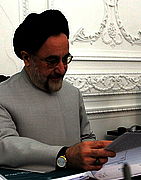End Mousavi and Karoubi’s Blockade
» Khatami Concerned About Green Movement Leaders and the Regime
After a two week lull, Iran’s former reformist president seyed Mohammad Khatami finally made expressed his view on the blockade of Green Movement’s leaders. According to the former president’s public relations office, Khatami, speaking to a group of university and cleric university lecturers called on Iranian officials to end the blockade and restrictions on the leaders of the green movement, their families, and political prisoners.
Khatami’s call came just a few hours after semi-official news sources had reported that Mir-Hossein Mousavi and Mehdi Karoubi, the recognized leaders of the Green Movement had been moved from their house to undisclosed locations.
Khatami’s two-week silence had brought on much criticism inside and outside Iran. He had not even commented on the February 14 and February 20th demonstrations in Iran that had been called in protest to the killings of at least five people across the country and also to demonstrate the Green Movement’s solidarity with the uprisings in the Middle East.
”After two years of unnecessary tension that could have been resolved or prevented through respect for the national and citizen’s rights – and which remains possible today - it was expected that the current impasse would have been resolved through reflection and affinity,” Khatami said.
Just a few weeks ago, personalities close to the leader of the Islamic republic openly accused Khatami, through a number of televised programs, of receiving direction for his actions from foreign security agencies such as those in the US and Israel. Saffar Herandi – a former culture minister in Mahmoud Ahmadinejad’s administration - was among them. Speaking at a formal gathering, he claimed that even during his presidency, Khatami had the overthrow of the Islamic republic on his mind and pursued the policy of separating the state from religion.
But in his talk two days ago, Khatami defended the 1979 revolution and the overall concept of the Islamic republic. He expressed his displeasure with those who negated “the great accomplishments” of the revolution, and asks, “When all leading authorities who had been approved by ayatollah Khomeini, the public and the supreme leader are now labeled as corrupt, deviant and counter revolutionaries, don’t people around the world then have the right to conclude that this revolution has produced nothing but corruption and digression? Is this not the biggest dishonor to the revolution? But if the climate in the country is opened and the constitution is accepted as the basis of actions and criticism and even protests are accepted within law, and both the advice of government officials and the free critique of ideas are accepted as a positive value, then would this not be a service to the revolution?”
In another part of his speech, Khatami talked about the blockade and house arrest that the leaders of the country’s Green Movement have been subjected to. “Such actions create conditions for those who do not believe in the regime, Iran, Iranians to possibly manipulate the honest feelings of people, particularly the youth,” he warned
Khatami questioned the actions of government authorities by saying why must individuals such as Mousavi and Karoubi who have served the revolution and the Islamic republic, and have demonstrated their loyalty to the principals of the revolution be put under restrictions and their houses blocked off. He another question that he raises with the authorities he again says would such acts not give opportunists reasons to question the very foundations of the regime?
And on political prisoners, Khatami called for their release, saying, “While freeing existing political prisoners is the right thing to do, in fact we witness the arrest and detention of even more prisoners.”
Just a few weeks ago, Khatami had announced the minimum conditions that must exist for reformers to return to mainstream political activity and elections, and release of political prisoners was one of them. But those calls were met with harsh responses from regime authorities. In one such response, hardline ayatollah Janati said, “We have no need for reformers to participate in elections.”
In his talk, Khatami also spoke of the two faces of Islam that have been presented, one the violent image – which has resulted in an anti Islamic movement around the world - and the other the “shining image”, which he attributed to the 1979 Islamic revolution. It was clear that even though he did not mention these two views to be representative of those inside the Islamic republic, this is what he had on his mind as he has detailed this theme in his earlier talks.
Khatami also returned to his initiative of dialogue between civilizations, adding that it could have turned the Islamic republic into a model system.
Speaking about the events in the Middle East, Khatami said that the people of this part of the world had over the past 100 years become more aware. And in remarks that may be an allusion to the current crackdown and suppressive measures against reformers in Iran today, he opined that while some of the uprisings and battles for freedom, dignity etc had seen setbacks and defeats, people never wavered on their demands and struggles for the negation of dictatorship and calls for freedom and dignity.

